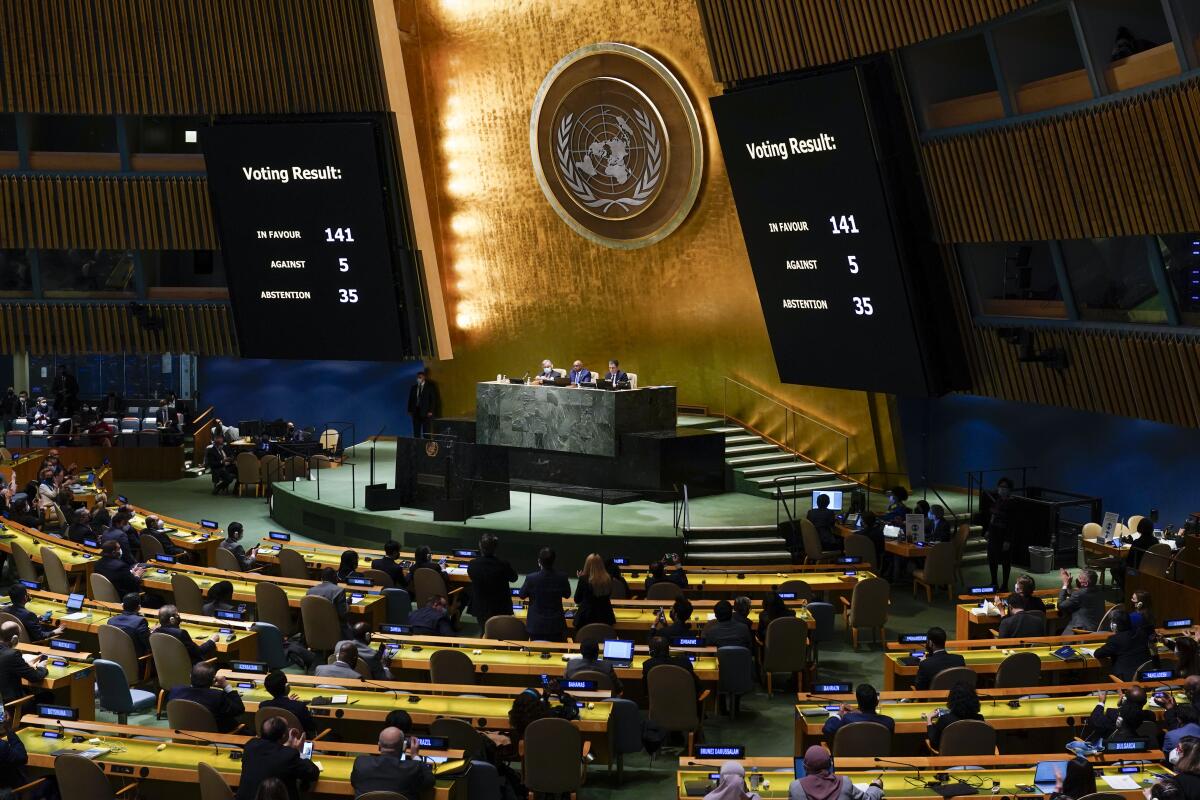Op-Ed: How Putin’s war has given birth to a new geopolitical Europe

- Share via
Brussels — Some weeks can feel like decades, and this week has been one of them. With Russia’s naked act of aggression against Ukraine, the tragedy of war has erupted in Europe once again. Russian forces have shelled residential housing, schools, hospitals and other civilian infrastructure. The Kremlin’s propaganda machine has been pushed into overdrive in its effort to justify the unjustifiable. More than 1 million people have already fled the violence, with more to follow.
Ukrainians, meanwhile, are mounting a heroic defense of their country, galvanized by President Volodymyr Zelensky’s leadership. Russian President Vladimir Putin may have convinced himself that Ukraine belongs to him under his vision of a “greater Russia.” But Ukrainians have demonstrated that their country belongs to them, and that they intend for it to have a European future.
The European Union has sprung into action. While some expected us to dither, disagree and delay, we have acted at record speed to support Ukraine, breaking taboos along the way. We have imposed unprecedented sanctions on Kremlin-linked oligarchs and those responsible for the war. Measures that were unthinkable just a few days ago — such as barring leading Russian banks from the SWIFT system and freezing the Russian central bank’s assets — are now in place. And for the first time ever, the EU is supporting member states as they supply military equipment to embattled Ukraine, mobilizing $553 million under the European Peace Facility.
We have done all this together with other countries to ensure maximum effect. The United States, the United Kingdom, Canada, Switzerland, Japan, Singapore and many other financial and economic nerve centers have joined us in adopting tough sanctions. The international outrage against Russia is cascading, even into sports and the arts. A stampede of companies is leaving the Russian market.
Still, the news from the ground in Ukraine is horrific and sobering, and no one knows how this war will end. Putin will try to excuse the bloodshed he has unleashed by depicting it as an unavoidable byproduct of some mythical clash between the West and the rest, but he will convince almost no one. The vast majority of countries and people around the world refuse to accept a world where an autocratic leader can simply seize whatever he wants through military aggression.
On March 2, an overwhelming majority of the United Nations General Assembly — 141 countries — voted to support Ukraine’s sovereign rights, denouncing Russia’s actions as a clear violation of the U.N. Charter and international law. Only four countries voted with Russia (the remaining 35 abstained). This historic display of global consensus shows just how much Russia’s leaders have isolated their country. The EU worked hard to achieve this outcome at the U.N.
In the week since Russia’s invasion, we have also witnessed the belated birth of a geopolitical Europe. For years, Europeans have been debating how the EU can be made more robust and security-conscious, with unity of purpose. We have now arguably gone further down that path in the past week than we did in the previous decade.
This is a welcome development, but there is so much more to do. First, we must prepare to support Ukraine and its people for the long haul — for their sake as well as our own. There will be no security for anyone if we allow Putin to prevail. If there are no longer any rules, we will all be in danger. That is why we must ensure that a free Ukraine survives. And to that end, we must maintain an opening for Russia to return to reason, so that peace can be reestablished.
Second, we need to recognize what this war means for European security and resilience more broadly. Consider the energy dimension. Clearly, reducing our dependence on energy imports from authoritarian and aggressive powers is an urgent strategic imperative. It is absurd that we have literally financed our opponent’s ability to wage war. The invasion of Ukraine should lend new momentum to our green-energy transition. Every euro that we invest in developing renewables at home will reduce our strategic vulnerabilities, as well as helping to avert catastrophic climate change.
Third, in a world of power politics, we need to build greater capacity to defend ourselves. Strengthening our defense means tackling Russia’s aggressive disinformation networks and going after the Kremlin’s ecosystem of finance and influence peddling.
This includes military means, and we need to develop them more. But the essence of what the EU did this week was to use all policies and levers — which remain mainly economic and regulatory in nature — as instruments of power. We should build on this approach in the weeks ahead, in Ukraine but elsewhere, too, as needed.
The core task for “geopolitical Europe” is straightforward. We must use our newfound sense of purpose first to ensure a free Ukraine, and then to reestablish peace and security across our continent.
Josep Borrell is high representative of the European Union for Foreign Affairs and Security Policy and a vice president of the European Commission.
More to Read
A cure for the common opinion
Get thought-provoking perspectives with our weekly newsletter.
You may occasionally receive promotional content from the Los Angeles Times.










